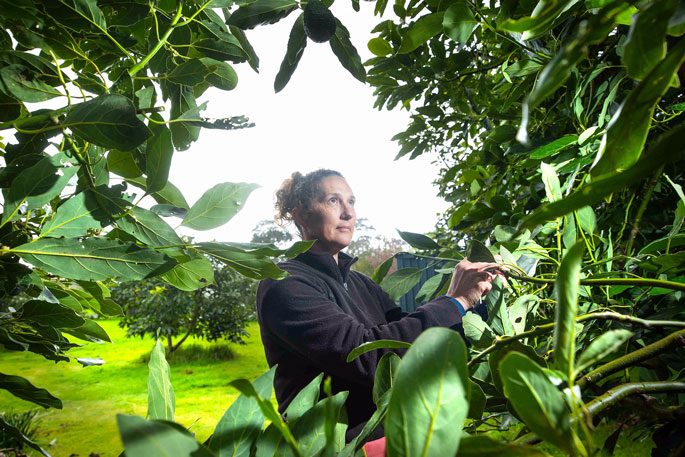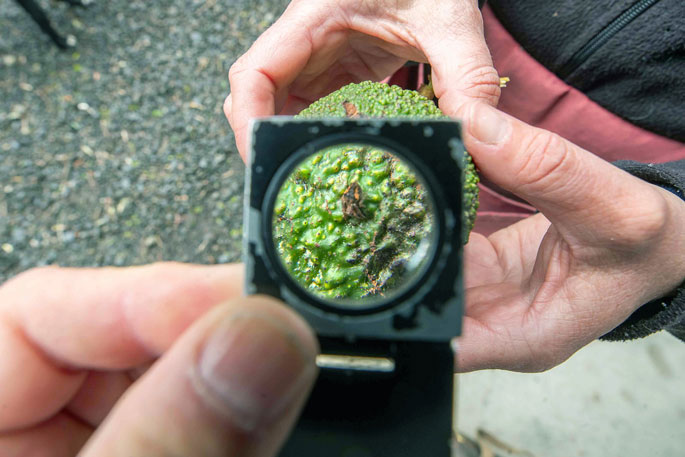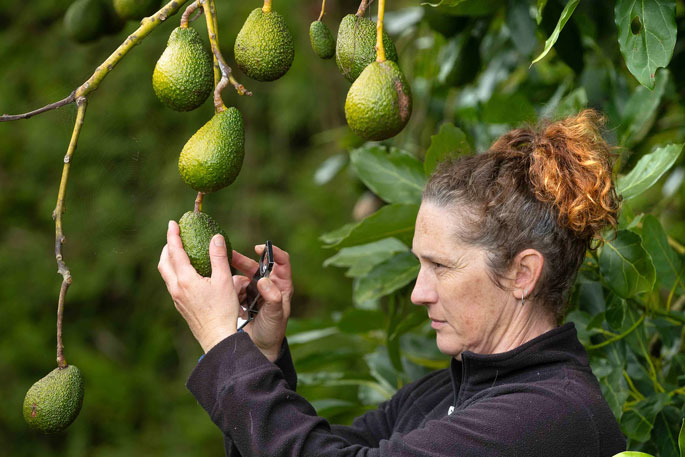A Katikati resident working as a bug finder on avocado orchards is devastated that a rapid decline in her eyesight is affecting her dream job.
Kirsten Warbrooke answered a newspaper advertisement for a pest control worker about eight years ago.
“We moved to the Bay of Plenty from Auckland in 2013 and I’d been working for Netball Waikato, so it involved a lot of travel. When I saw the role come up, I realised it was perfect for my rural lifestyle.”
She went through the accreditation process and now works on a freelance basis checking fruit tree leaves for signs of pest infestation on properties in the Western Bay. In the last year, she noticed a dramatic difference in her eyesight.
“I need to check a certain number of random leaves and fruit. On an orchard under 4ha, I take a 10-tree sample group and inspect 20 leaves and 10 fruit on each tree. I used to be able to see bugs with my naked eye. Now, I need to use a larger magnifying glass on the job.”
Eyesight
In fact, the 49-year-old noticed the deterioration has affected all aspects of her life.
“My eyes are buggered. I can’t see writing on my computer or phone screen or read recipes on food labels without glasses. I realised that I was inspecting too many properties each day when I almost fainted trying to cook dinner one evening.”
Now, she does no more than five orchards in a day.
“I’m shocked that my eyesight has impacted my job,” says Kirsten. “I can’t work without a bigger magnifying glass. I need to take more time and inspect the plants more closely.”
 Kirsten Warbrooke amongst avocados on an orchard in the Western Bay of Plenty. Photo: John Borren.
Kirsten Warbrooke amongst avocados on an orchard in the Western Bay of Plenty. Photo: John Borren.
Her experience is no surprise to optometrists. Research conducted by Specsavers, found that one of the most significant reasons for New Zealand’s 6.1 per cent fall in workplace productivity last year was poor eye health.
Almost half of those surveyed admitted their eyesight negatively impacts their productivity at work and 46% of the people surveyed reported that they’d had to redo a task at work at least once or spend more time on a task due to debilitating symptoms related to eye strain.
Lifestyle effects
Modern lifestyle in general is having a noticeable effect on eye health.
“People are coming to Specsavers clinics with complaints of dry, blurry eyes, headaches and not being able to see their screens,” says Tauranga optometrist Sam Sharples. “Whether they’re at a desk at work or in front of a TV in the evening, Kiwis hardly ever have a break from their screens.”
He says the symptoms are often caused by eye strain from looking at a device or certain object – like small bugs - for too long.
“Remember to blink to keep the surface of your eyes from drying out and drink plenty of water,” he advises. “Follow the 20-20-20 rule which involves shifting your eyes away from the screen every 20 minutes to look at an object at least 20m away, for at least 20 seconds. Also, spend time outside to give your eyes a break – not hard for Kirsten!”
 An up-close look of an avocado. Photo: John Borren.
An up-close look of an avocado. Photo: John Borren.
Sam says any career that involves attention to detail might cause a decline in eye health, and for people who work in medicine, or on a construction site, it has the potential to impact safety.
“Getting your eyes tested every two years will allow optometrists to pick up changes in your eyes, especially since a lot of severe conditions appear with little to no symptoms.”



2 comments
Confusing Article
Posted on 08-10-2024 07:40 | By Thats Nice
Are you saying that the pest monitoring job has affected the speed of the natural decline in our eyesight as we age? I agree that 5 orchards a day is enough with this type of work. Yes, lots of things affect our eyesight particularly looking at screens.
close vision
Posted on 08-10-2024 08:32 | By tsimpson@visiquegreerton.co.nz
probably worth mentioning that if you have good distance vision at age 49 you are going to need glasses for close work no matter what job you do! it's natural ageing. Sam is correct with the 20,20,20 rule but it won't stop you needing close work help at that age.
Leave a Comment
You must be logged in to make a comment.